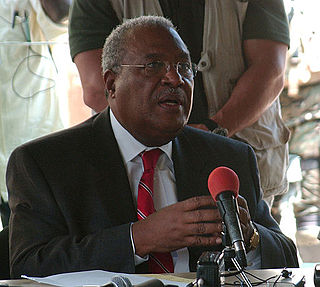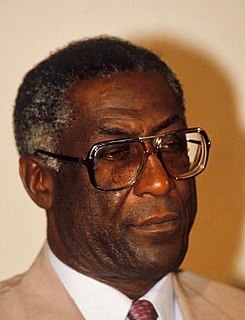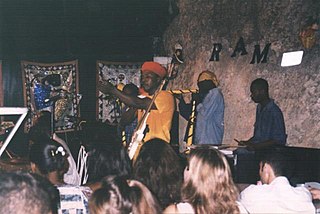
Haiti, officially the Republic of Haiti, and formerly known as Hayti, is a country located on the island of Hispaniola in the Greater Antilles archipelago of the Caribbean Sea, to the east of Cuba and Jamaica and south of The Bahamas and the Turks and Caicos Islands. It occupies the western three-eighths of the island which it shares with the Dominican Republic. To its south-west lies the small Navassa Island, which is claimed by Haiti but is disputed as a United States territory under federal administration. Haiti is 27,750 km2 (10,714 sq mi) in size, the third largest country in the Caribbean by area, and has an estimated population of 11.4 million, making it the most populous country in the Caribbean. The capital is Port-au-Prince.
The recorded history of Haiti began on 5 December 1492, when the European navigator Christopher Columbus landed on a large island in the region of the western Atlantic Ocean that later came to be known as the Caribbean. It was inhabited by the Taíno and Arawakan people, who variously called their island Ayiti, Bohio, and Kiskeya(Quisqueya). Columbus promptly claimed the island for the Spanish Crown, naming it La Isla Española, later Latinized to Hispaniola.

Jean-Bertrand Aristide is a Haitian former Salesian priest and politician who became Haiti's first democratically elected president. A proponent of liberation theology, Aristide was appointed to a parish in Port-au-Prince in 1982 after completing his studies to become a priest. He became a focal point for the pro-democracy movement first under Jean-Claude "Baby Doc" Duvalier and then under the military transition regime which followed. He won the 1990–91 Haitian general election, with 67% of the vote. As a priest, he taught liberation theology and, as a president, he attempted to normalize Afro-Creole culture, including Vodou religion, in Haiti.

René Garcia Préval was a Haitian politician and agronomist who served twice as President of Haiti; once from early 1996 to early 2001, and again from mid 2006 to mid 2011. He was also Prime Minister from early to late 1991.

A coup d'état in Haiti during February 2004, which occurred after conflicts lasting for several weeks, resulted in the removal of President Jean-Bertrand Aristide from office. Aristide was flown from Haiti by U.S. military/security personnel, preventing him from finishing his second term.

Mildred Trouillot-Aristide is an American lawyer who married Jean-Bertrand Aristide, the former President of Haïti, in 1996.

Gérard Latortue is a Haitian politician and diplomat who served as the prime minister of Haiti from 12 March 2004 to 9 June 2006. He was an official in the United Nations for many years, and briefly served as foreign minister of Haiti during the short-lived 1988 administration of Leslie Manigat.

Boukman Eksperyans is a mizik rasin band from the city of Port-au-Prince, Haiti, Grammy nominated for their debut album Vodou Adjae. The band derives its name from Dutty Boukman, a vodou priest who led a religious ceremony in 1791 that is widely considered the start of the Haitian Revolution. The other half of the band's name, "Eksperyans", is the Haitian Creole word for "experience", and was inspired by the band's appreciation of the music of Jimi Hendrix. The band was at the height of its popularity in 1991 when the presidency of Jean Bertrand Aristide was overthrown in a military coup d'etat. Like many other artists and performers, Boukman Eksperyans fled the country to live in exile. During their time abroad, the band performed and spoke out against the military dictatorship of Raoul Cédras. In 1994, after Aristide was restored to power, the band returned to Haiti, where they continued to play concerts, record albums, and perform at the Carnival celebrations.

Gérard Jean-Juste was a Roman Catholic priest and rector of Saint Claire's church for the poor in Port-au-Prince, Haiti. He was also a liberation theologian and a supporter of the Fanmi Lavalas political party, as well as heading the Miami, Florida-based Haitian Refugee Center from 1977 to 1990.

General elections were held in Haiti on 7 February 2006 to elect the replacements for the interim government of Gérard Latortue, which had been put in place after the 2004 Haiti rebellion. The elections were delayed four times, having originally been scheduled for October and November 2005. Voters elected a president, all 99 seats in the Chamber of Deputies of Haiti and all 30 seats in the Senate of Haiti. Voter turnout was around 60%. Run-off elections for the Chamber of Deputies of Haiti were held on 21 April, with around 28% turnout.

Marc Louis Bazin was a World Bank official, former United Nations functionary and Haitian Minister of Finance and Economy under the dictatorship of Jean-Claude Duvalier. He was prime minister of Haiti appointed on June 4, 1992 by the military government that had seized power on September 30, 1991.
Jean-Claude Bajeux was a Haitian political activist and professor of Caribbean literature. For many years he was director of the Ecumenical Center for Human Rights based in Haiti's capital, Port-au-Prince, and a leader of the National Congress of Democratic Movements, a moderate socialist political party also known as KONAKOM. He was Minister of Culture during Jean-Bertrand Aristide's first term as President of Haiti.

RAM is a mizik rasin band based in the city of Port-au-Prince, Haiti. The band derives its name from the initials of its founder, songwriter, and lead male vocalist, Richard A. Morse. The band's music has been described by Morse as "Vodou rock 'n' roots", and has been one of the prominent bands in the mizik rasin musical movement in Haiti. RAM began performing together in 1990, and recorded their first album in 1996. The band's music incorporates traditional Vodou lyrics and instruments, such as rara horns and petro drums, into modern rock and roll. The band's songs include lyrics in Haitian Creole, French, and English.

Cité Soleil is an extremely impoverished and densely populated commune located in the Port-au-Prince metropolitan area in Haiti. Cité Soleil originally developed as a shanty town and grew to an estimated 200,000 to 400,000 residents, the majority of whom live in extreme poverty. The area is generally regarded as one of the poorest and most dangerous areas of the Western Hemisphere and it is one of the biggest slums in the Northern Hemisphere. The area has virtually no sewers and has a poorly maintained open canal system that serves as its sewage system, few formal businesses but many local commercial activities and enterprises, sporadic but largely unpaid for electricity, a few hospitals, and two government schools, Lycee Nationale de Cite Soleil, and Ecole Nationale de Cite Soleil. For several years until 2007, the area was ruled by a number of gangs, each controlling their own sectors. But government control was reestablished after a series of operations in early 2007 by the United Nations Stabilization Mission in Haiti (MINUSTAH) with the participation of the local population.

Michel Joseph Martelly is a Haitian musician and politician who was the President of Haiti from May 2011 until February 2016. He is one of Haiti's best-known musicians for over a decade, going by the stage name Sweet Micky. For business and musical reasons, Martelly has moved a number of times between the United States and Haiti. When travelling to the United States, Martelly mostly stays in Florida. After his presidency, Martelly returned to his former band and sang a carnival méringue entitled "Bal Bannan nan", as a mocking response to Liliane Pierre Paul, a famous Haitian female journalist in Port-au-Prince.
Richard Auguste Morse is a Puerto-Rican-born Haitian-American musician and hotel manager currently residing in Port-au-Prince, Haiti. Morse manages the Hotel Oloffson, and is the founder of a mizik rasin band, RAM, named after his initials. Morse is married to the band's lead female vocalist, Lunise Morse, and has two children. Morse and his band are famous in Haiti for their political songs and performances critical of the Raoul Cédras military junta from 1991 to 1994. In the early 2000s, Morse has also criticized Jean-Bertrand Aristide and Fanmi Lavalas through his music. Morse is a United States citizen. His cousin Michel Martelly is a musician, right-wing Haitian politician and former President of Haiti. Richard Morse repeatedly expressed support for Martelly in the 2010 presidential elections in Haiti. By 2014, he had distanced himself from the Martelly government.
Haitian art is a complex tradition, reflecting African roots with strong Indigenous, American and European aesthetic and religious influences. It is an important representation of Haitian culture and history.

The 1991 Haitian coup d'état took place on 29 September 1991, when President Jean-Bertrand Aristide, elected eight months earlier in the 1990–91 Haitian general election, was deposed by the Armed Forces of Haiti. Haitian military officers, primarily Army General Raoul Cédras, Army Chief of Staff Phillipe Biamby and Chief of the National Police, Michel François led the coup. Aristide was sent into exile, his life only saved by the intervention of US, French and Venezuelan diplomats.
Sacha "Tebó" Thébaud was a Haitian-American painter, sculptor, architect-engineer, furniture designer, urban planner, environmental reformer.

Corruption in Haiti occurs at one of the worst rates in the world. Corruption is a scourge that corrodes all attempts to establish a rule of law, a sustainable democracy, and to improve the quality of life of Haiti's people. Haiti's corruption perception index is 25.44 in Transparency International's 2017 Corruption Perception Index, ranking the country 157th place out of 180 countries.













